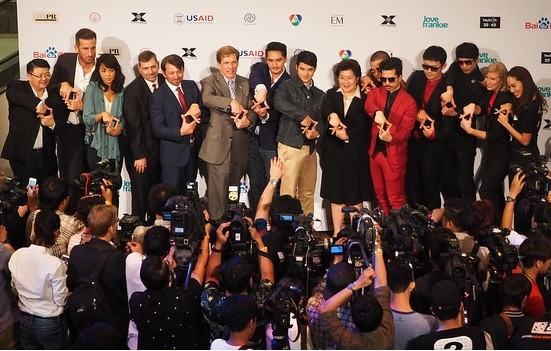Speeches Shim

March 2016—Fishing is one of the biggest industries in Southeast Asia, and fishing boats are fraught with extremely difficult working conditions—including human trafficking.
Trafficked fishermen spend an average of 1.5 years trapped on boats, according to a recent survey. In many cases, they face 18- to 20-hour days, live in cramped quarters, face drinking water and food shortages, and are required to work even when they are ill. Boat owners prevent fishermen from leaving through threats of financial penalty and physical violence. In the end, many of these fishermen are never paid.
Highlighting this issue can be challenging, so celebrities who can reach millions are helping to do just that.
USAID partners with the International Organization for Migration (IOM) in the IOM X campaign to encourage safe migration and public action to stop exploitation and human trafficking and raise awareness among youth about the dangers of being exploited. The campaign was launched in October 2014.
The campaign developed and released Prisana, a short film and music video starring two of Thailand’s most famous actors to illustrate one of the worst forms of human trafficking. The video, available online and broadcast on public stations in Burma, the Philippines and Thailand, has reached 48.9 million viewers.
“We like to think of the term ‘slavery,’ or ‘modern day slavery,’ or just the word ‘slavery,’ enslaving people, it’s a thing of the past,” said Ananda Everingham, a producer and actor involved in making Prisana. “But what’s really scary is that 20 million people in this world fall victim to slavery.”
In Prisana, Thai actor Mario Maurer plays a photographer who helps a migrant woman look for her husband, a victim of human trafficking in the fishing industry.
“The character I played in the video, these people exist in real life,” said Maurer. “They are taken to boats and they could be relatives, brothers, sisters. In the film, it was a husband who was lost. But it’s real. They go out to work thinking they can send money home, but it turns out they were exploited.”
According to the International Labour Organization, 20.9 million people around the world are victims of forced labor. Of that figure, 11.7 million are within the Asia-Pacific region, with Southeast Asia a key supplier of people into illegal, unpaid and exploitative situations. Of these victims, 55 percent are women and girls.
The State Department’s 2015 Trafficking in Persons Report categorizes most countries in the Association of Southeast Asian Nations as Tier 2, and some Tier 3, meaning that they do not fully comply with minimum standards for the elimination of human trafficking.
USAID contributes to the U.S. Government’s global efforts to address trafficking in persons through its longstanding Asia-based campaign, MTV EXIT, which since 2006 has raised awareness and increased human trafficking prevention efforts across Asia.
“We can take responsibility. We use music, art as a tool,” said Karinyawat Durongjirakan, the lead singer of popular Thai band Slot Machine. “We can get through to the new generation and educate them. This problem is everyone’s problem in this world.”
USAID and IOM X work closely with celebrities, private sector partners, government agencies, NGOs and youth groups across the Asia-Pacific region.
LINKS

Comment
Make a general inquiry or suggest an improvement.